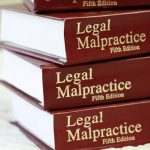I hear it all the time; “My lawyer screwed up. I want to sue.”
As a Board Certified Georgia Legal Malpractice Attorney, I get these calls often. Unfortunately, Georgia law requires a little more evidence than a clear mistake by the attorney for you to actually succeed in a legal malpractice case. You’ll need to fulfill at least three essential elements in order to have a valid claim:
- There was an attorney-client relationship, or at least a good faith basis for relying on the attorney.
- The attorney failed to exercise ordinary care, skill and diligence.
- Damages (loss of money, property, health, etc.) were caused by the attorney’s failure, and not some other factor.
Let’s start with #3 above, as damages can be difficult to prove. Here is an example of a real case. You be the judge, and I’ll share the expert opinions at the end.
Is this a case of Legal Malpractice?
A woman was eating pie at a restaurant and swallowed some pieces of glass. This caused a number of ongoing and expensive health issues. The woman decided to hire a lawyer to go after the restaurant chain, and signed a contract with Lawyer A.
Lawyer A made (and documented) a number of commitments, but did not meet them. The case dragged on for over a year, with only minimal communication from Lawyer A. The client’s phone calls were ignored, or returned by other non-lawyer staff members with little or no knowledge of the case. Moreover, Lawyer A also lost the evidence, a baggie with the pie and glass shards, but did not disclose that fact to the client.
The woman became frustrated and hired another lawyer (Lawyer B), who promptly requested the case file from Lawyer A. At that point, Lawyer A disclosed that he lost the evidence baggie. Lawyer B still decided to send a letter to the restaurant chain demanding some restitution, but learned that the restaurant company had recently gone bankrupt. With no available money set aside in trust or insurance coverage available for the client’s claims, at best the client would be added to the list of hundreds of unsecured creditors. There was little to no chance of financial recovery from the restaurant chain.
The woman asked Lawyer B to sue Lawyer A for legal malpractice. Lawyer B confirmed that Lawyer A had a liability insurance policy that covers legal malpractice. Does she have a case?
And the legal malpractice votes are in…..
Does the woman have a valid claim against Lawyer A? No. I know this may be tough to swallow, and even Lawyer B had trouble believing my feedback. There was an attorney-client relationship, breach of duty, and damages. It should be a slam dunk, right? Wrong.
Uncollectible judgments:
There is another often-overlooked detail required to prove a viable legal malpractice case: the underlying matter must be collectible. In other words, a client must show that if the lawyer had handled the case correctly:
- The client would have been successful in the underlying legal matter, and
- The damages would have been collectible.
In the example above, the potential legal malpractice case went belly-up when the restaurant chain went bankrupt. Lawyer A may have committed malpractice by not acting soon enough or by losing the evidence, but a Court will also look at whether the claim against the restaurant chain was collectible. Even though Lawyer A lied about the evidence and delayed the legal process, the argument will be that the lie and the delay didn’t cause any specific damage and the restaurant was going out of business anyway. Although it doesn’t seem fair, there is no legal malpractice case against Lawyer A because the underlying case against the restaurant chain was not collectible.
If you’re interested, the precedent-setting case is McDow v. Dixon, 226 S.E.2d 145 (Ga. Ct. App. 1976).
Have an expert review your legal malpractice claim:
As you can see, legal malpractice cases can be very complicated to prove, and attorneys who don’t regularly pursue these claims often don’t understand the nuances required for a successful lawsuit. Before you attempt to sue your lawyer, find an attorney who focuses their practice on legal malpractice matters to evaluate your case. Don’t spend any more of your valuable time and money until you know that at least you have the fundamentals required for a successful legal malpractice case.




